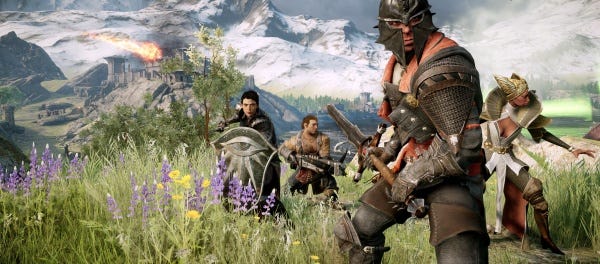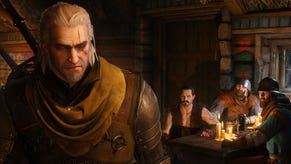BioWare On Dragon Age's Combat, Exploration, Choices
Who Quizzes The Inquisitors, Pt 1
BioWare's finally taken the wraps off Dragon Age: Inquisition, and hey, it looks like it might actually be worth getting excited over. Far from the chaffingly cramped confines of Dragon Age II's Kirkwall, Inquisition seems rife for roaming - a land that will whet your appetite for exploration and then stuff your intestines with intrigue until you have no choice but to physically ingest a Call of Duty game to correct the balance. Also, combat looks interesting again! There is tactical view. And rolling. Somewhat astonished, I sat down with lead designer Mike Laidlaw to discuss the resurgent role-player's newfound confidence in tactical combat, wide-open exploration, and choices that actually bar players from a significant portion of the game.
RPS: Everybody first assumed your combat was inspired by The Witcher, but it almost looks kind of Dark Soulsy with all the rolling. What sort of basic rhythm are you aiming for?
Laidlaw: Honestly, a lot of it is stuff we’ve done in the previous DAs. We’ve upped the fidelity of the presentation. I don’t think evading lives in the realm of Dark Souls, nor do I think the Witcher owns strafing. But it’s abilities and movement that are designed to be smooth. They’re designed to let you focus on an enemy or pull back as you see fit. They fundamentally rely on things like your stamina. They have the elements of resource management throughout them.
The other big thing, that for us is a huge consideration, is making sure that stuff like “I’m rolling to the side!’ is workable within that pause-and-play and with the tactical. That’s something that people sometimes have trouble wrapping their heads around, but all you have to picture is, I trigger the evade ability, I get to drive a little AOE like a compass around, I say that’s where I want to roll, and that gives you the direction for where you go as soon as you unpause.
RPS: Another thing you really emphasized was the fact that now you actually have to manage your health and make sure you’re not walking away from every fight with a little sliver of it left. That sounded to me like it would add maybe an element of survival, almost. Is that what you were going for?
Laidlaw: I wouldn’t say survival is the key, but it’s certainly a factor as part of that. More than anything, what I want out of it is the sense that, as a player, I need to take the game seriously and consider my actions. If enemies are largely inconsequential in the course of a fight – I recover almost instantly! – then you could consider them to be bags of experience points that you want to tackle. But as soon as you introduce the idea that health is sustaining damage, you move closer to a pen and paper experience. You move closer to the more old-school, hardcore approach to role-playing.
Suddenly you’re challenging players and saying, “Well, you’re gonna go fight that dragon. Are you going to skirt around everything? Are you going to fight very carefully on your way there so you’re not low on resources or low on health when you go to fight the big guy?” That the kind of thing that I think creates really interesting challenges for the player. So I don’t see a situation where, necessarily, you’ll be so worn down by the game that you won’t be able to get home. That kind of thing, that works really well, but it’s not really key to the experience that we want. It’s more about thinking long term and planning ahead, rather than planning backwards.
RPS: Locations look nicely expansive and rife with side paths, but are you considering this an open world?
Laidlaw: “Open world” I think is a really loaded term, because everyone immediately thinks of Skyrim and assumes everything will be exactly like Skyrim. In our case, there are extremely large regions you can explore. It’s a multi-region game, which means that you’ll traveling with a world map. You’re traveling across this chunk of the continent in which the game is set. And each of the regions is purposeful. It has a reason you would be brought here. It ties back to the story, or at least to the overall themes of the game. “These are my enemies and they’re very active here. I should find out why.”
That kind of stuff. That means that they aren’t necessarily laden with story, because story is the antithesis of discovery, right? It tends to lead you along. But when you’re discovering things, you should feel like they’re part of the overall game and not random. I would say that it has elements of open world for sure, but it’s something closer to the feel we had in the Baldur’s Gate games or in Origins, even, where it’s larger areas, big spaces, and the chance for you to move around and see a wide variety of different terrains and locales and so on.
RPS: You were pointing out areas where you could go off the beaten path, but you ended up staying and doing more story-based stuff. How many areas are there like that in a given location? How much have you littered this world with things where it’s just, “Oh, go over there and do that”?
Laidlaw: It’s quite dense. There’s a lot of different opportunities in the desert area we saw, a lot of things we didn’t approach, but could have, and gone to explore and so on. It’s just a matter of time to show that off. But the goal for me is that when you arrive in an area, you should be able to spin the camera and see a bunch of cool stuff that makes you say, “What’s that?” And you start heading in that direction to identify it. And then over time, there can be reasons, or maybe you’re doing something for a companion or pursuing a lead or something like that, that will bring you back to spaces. Of course, the final stage, then, is things you’ve opened up as new opportunities because the Inquisition has had a presence here.
RPS: Right. So on any given one of those little side areas, how much depth is there? If you were to go into some random cave that you found, how long would you be in there? How much stuff could you do?
Laidlaw: It varies depending on the cave. You need a good mixture. Not every cave is going to be a seven-story epic dungeon. Actually no cave is going to be that. I think that our goal is always to try and have it make sense. If the area is full of bandits and smugglers, you can expect a lot of caves and grottoes and stuff where they’ve tucked their goods away. To me, you shouldn’t evaluate just a single cave. The goal for me is that we create an experience. If I feel like, “Oh, wow, this was an elven stronghold one day,” and I keep finding runes and all these things, they all should incorporate and turn into a larger experience where the area and the location is helping me see and experience something that builds up over time.
It’s a kind of environmental storytelling, rather than someone gabbing at you or handing you books. It’s something that, frankly, the crew working on the BioShock games, Levine and company, are exceedingly good at. Everyone remembers coming around that first area in Rapture and all the cancelled bathyspheres, and it made you go, “Wow! Neat!” Nobody said a damn thing, but I really understood what Rapture was about in that moment. I think for us, if the whole area helps lead you to a deeper understanding of what’s going on – whether it be ancient magical artifacts scattered around a desert and you start to piece together what that means – that’s asking the player to engage and think and to be critical in a cool way.
RPS: Will there be any cameos by the cave from Dragon Age II? The infamous cave?
Laidlaw: Oh, the cave. No, I don’t expect that cave will return. I think we’ve probably used it enough.
RPS: You were discussing all the potential repercussions for choices. You were saying that it’s very possible for content to be blocked off if you make certain choices.
Laidlaw: Absolutely.
RPS: How much of the game functions that way? If a player goes through and only plays once, roughly how much will they… I don’t want to say “miss out on,” but the nature of choice being what it is, making a real impactful choice, how much could that close off?
Laidlaw: I couldn’t say at this point. I think that’s something we need to be closer to final to lock down. But our goal is that it’s a significant amount, a fifth or a quarter or so, that’s showing some degree of exclusivity. And then you can layer on top of that a certain amount of stuff that you probably just won’t find. “Oh, you didn’t go east there. Wow. Well, you missed out on the big dragon carcass or what have you.” That kind of stuff is good.
I think that our goal, more than worrying about percentages, is that when I present a choice, or when my team presents a choice, to a player, our goal with Inquisition is that we honor that choice. This goes all the way to, “What are you importing into the world?” If it’s something that we’re going to tackle at all, I want it to be significantly different.
Similarly, if you make a choice where it’s, “Well, you’re going to have to side with one of these two groups,” or “Either that guy’s gonna die or that guy’s gonna die,” or anything that’s on that level, I would hate for a character to just say “Thanks!” and you’re done. Instead, we want it to have more depth than that. More than worrying about the numbers, it’s about a philosophy. It’s something we’re really working really hard on, to make sure that we either honor the choice or get rid of it. Sometimes you simply have to, because the ramifications are too big. But more often than not it’s just finding a good and interesting and satisfying way to say, “Yeah, that matters. I see how.”
RPS: One of the things I found really interesting is that you can toggle on and off the thing that essentially tells you, more or less, what the outcome of your choice will be. I'm not sure how I feel about that.
Laidlaw: To be clear, it never tells you the outcome. It tells you the action will take. That’s a pretty distinct difference. The outcome is like, “This will result in war.” The action is, “You will behead him.” So you need to understand that. I would never want to tell you the outcome, because that’s annoying. There’s GameFAQs for that.
RPS: I think that is a very important distinction to make, because there’s something about… If you know roughly what’s going to happen because of a choice, then there’s not really a choice beyond what you want to see go on.
Laidlaw: Exactly.
RPS: That's good, because I think my favorite choices in games didn't telegraph their outcomes. I had to chew them in my mind over and over and over. And even then, I was like, "Well, a bunch of things could happen! There is no right answer." I've stopped playing games for days because of choices like that, just to mull them over. I seriously love it when that happens.
Laidlaw: I think that as soon as you engage a player on that level, where they’re going, “Oh, jeez, I don’t know what to do here…” One of our great dilemmas is, do I go and rescue Kaidan or do I go and rescue Ashley, before the nuke goes off? In that case, you know exactly what’s going to happen. The nuke is going to go off and somebody is probably going to die. The game makes it very clear. And there is no right answer. Somebody is making it out and somebody isn’t going to appear in game three.
That’s a great dilemma, to me, because you have to ask yourself [to make a tough call]. There is no right way to do this. There’s just a choice to make. Those kinds of things can be very compelling, because they pull you in.
Now, sometimes, you need to be surprised. There needs to be a choice where it’s, “Okay, I’m going to do this,” and you may not understand that there will be repercussions later in the game. But I do think they are at their best when there’s some sort of immediacy to the change, whether it’s a different scene happens, or some element appears immediately, but long term it’s always a pleasant surprise when the game remembers and somebody comes seeking vengeance or what have you.
RPS: The one thing that I did notice about the main choice that you showed is that it was kind of a battle between “good” and self-serving practicality. It was defend the wounded or defend the keep, which will ultimately benefit you. That’s kind of a simple, relatively traditional binary.
Laidlaw: It is, except you’re dealing with three, right? So you’re dealing with, specifically, am I going to make this hard on myself and not have my men as reserves at all? Or am I going to preference the people or preference my forces? That’s one of those things where you could - if you think about the potential options – you could just not talk to those guys. That’s another option. In which case you don’t receive any benefit from being kind to them, but they also aren’t necessarily getting killed.
We’re trying to avoid a thing where it’s good or bad. These guys signed up. They knew what they were getting into. Sometimes you have to make that call. But I guess what I want players to say is, “Wow, if I’d kept the guys back and told them to heal up their wounded, and I lost the village… What if I hadn’t?” Right? And of course, at that point, if you really want to, reboot. See if you’re good enough to handle it.
And it also has a mechanical effect. It’s not just like, “I chose some things and got a news report later saying they were all killed.” You get to see how that all actually plays into the game.
RPS: You put a lot of emphasis on the scope of choices, as well. The ability to "change the world" and whatnot.
Laidlaw: Yeah. The physicality of the changes is something I’m pretty jazzed about. I think it’s neat to… It’s something we’ve never tackled before, and I think it’s very cool. It’s something the engine actually opened up as an opportunity for us.
RPS: I thought Dragon Age II did an excellent job of emphasizing smaller scale stuff, though - if not necessarily the impacts of your decisions. How much have you taken from that, er, less well-loved side of the equation?
Laidlaw: Well, small-scale choices are something that’s kind of our bread and butter. The moment to moment – is Varric upset, is Varric happy, what kind of responses do you give – all those things are kind of standard issue for us. It’s something we always tackle. As a studio, in a lot of ways, we’re very character-focused. Those small things are almost… We almost take them for granted. But certainly they’re present in Inquisition. It’s just that taking this to the next level and having a physical impact on the world is something that’s all new, that we’ve never done before.
Check back tomorrow for part two, in which we discuss sex/race choices and BioWare's approach to issues like racism, the possibility of advancing the Dragon Age series to a wildly different time period, Inquisition's revamped take on romances, and tons more.























